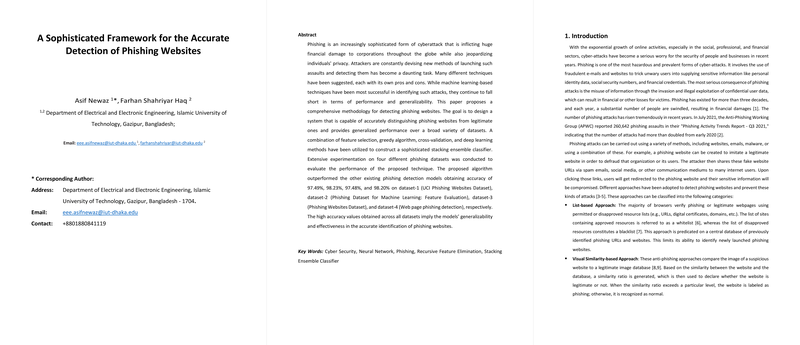The paper "A Sophisticated Framework for the Accurate Detection of Phishing Websites" addresses the escalating challenge of detecting phishing websites, which pose significant risks to both corporations and individual privacy through increasingly cunning cyberattacks. The authors recognize the limitations in performance and generalizability of existing machine learning-based detection techniques and propose a novel solution to overcome these challenges.
Methodology
The paper introduces a comprehensive methodology to effectively differentiate between phishing and legitimate websites. Key components of this approach include:
- Feature Selection: Identifying the most relevant features for phishing detection to enhance the model's accuracy.
- Greedy Algorithm: Employing a strategy to optimize feature selection and improve model efficiency.
- Cross-Validation: Utilizing this technique to ensure the model's robustness and consistency across different datasets.
- Deep Learning Methods: Implementing advanced neural network architectures to capture complex patterns associated with phishing activities.
The authors propose a stacking ensemble classifier that integrates these techniques to build a more sophisticated and generalized model.
Experimental Evaluation
The proposed model was rigorously tested on four different phishing datasets to evaluate its performance:
- UCI Phishing Websites Dataset
- Phishing Dataset for Machine Learning: Feature Evaluation
- Phishing Websites Dataset
- Web Page Phishing Detection
The experiments demonstrated that the model achieved remarkable accuracy rates of 97.49%, 98.23%, 97.48%, and 98.20% across these datasets, respectively. These impressive accuracy figures underscore the model's generalizability and effectiveness in accurately identifying phishing websites across diverse scenarios.
Conclusion
The paper highlights the model's potential to significantly enhance phishing detection capabilities, offering a reliable and robust alternative to existing solutions. The combination of feature selection, greedy algorithms, cross-validation, and deep learning methods contributes to a robust detection framework that addresses the current limitations of generalizability and performance in phishing detection. This research provides a significant step forward in the ongoing battle against phishing attacks.
